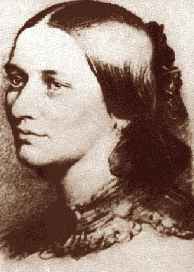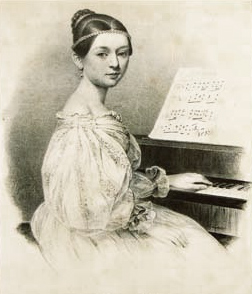<Back to Index>
- Physician Major Walter Reed, 1851
- Pianist and Composer Clara Josephine Wieck Schumann, 1819
- President of Costa Rica Óscar Rafael de Jesús Arias Sánchez, 1940



Clara Schumann (née Clara Josephine Wieck; 13 September 1819 – 20 May 1896) was a German musician and composer, considered one of the most distinguished pianists of the Romantic era. She exerted her influence over a 61-year concert career, changing the format and repertoire of the piano recital and the tastes of the listening public. Her husband was the composer Robert Schumann. She and her husband encouraged Johannes Brahms, and she was the first pianist to give public performances of some of Brahms' works, notably the Variations and Fugue on a Theme by Handel.
Clara Josephine Wieck was born in Leipzig on 13 September 1819 to Friedrich and Marianne Wieck (née Tromlitz). Her parents divorced when she was six years old; Clara was raised by her father. In March 1828, at the age of eight, the young Clara Wieck performed at the Leipzig home of Dr. Ernst Carus, director of a mental hospital at Colditz Castle, and met another gifted young pianist invited to the musical evening named Robert Schumann, nine years older than she. Schumann admired Clara's playing so much that he asked permission from his mother to discontinue his studies of the law, which had never interested him much, and take music lessons with Clara's father, Friedrich Wieck. While taking lessons, he took rooms in the Wieck household, staying about a year. In 1830, at the age of eleven, Clara left on a concert tour to Paris via other European cities, accompanied by her father. She gave her first solo concert at the Leipzig Gewandhaus. In Weimar, she performed a bravura piece by Henri Herz for Goethe, who presented her with a medal with his portrait and a written note saying, "For the gifted artist Clara Wieck." During that tour, Niccolò Paganini was in Paris, and he offered to appear with her. However, her Paris recital was poorly attended as many people had fled the city due to an outbreak of cholera.
At the age of 18, Clara Wieck performed a series of recitals in Vienna from December 1837 to April 1838. Austria's leading dramatic poet, Franz Grillparzer, wrote a poem entitled "Clara Wieck and Beethoven" after hearing Wieck perform the Appassionata Sonata during one of these recitals. Wieck performed to sell-out crowds and laudatory critical reviews; Benedict Randhartinger, a friend of Franz Schubert, gave Wieck an autograph copy of Schubert's Erlkönig, inscribing it "To the celebrated artist, Clara Wieck." Frédéric Chopin described her playing to Franz Liszt,
who came to hear one of Wieck's concerts and subsequently "praised her
extravagantly in a letter that was published in the Parisian Revue et Gazette Musicale and later, in translation, in the Leipzig journal Neue Zeitschrift für Musik." On 15 March, Wieck was named a Königliche und Kaiserliche Kammervirtuosin ("Royal and Imperial Chamber Virtuoso"), Austria's highest musical honor. In
her early years her repertoire, selected by her father, was showy and
popular, in the style common to the time, with works by Kalkbrenner, Henselt, Thalberg, Herz, Pixis, Czerny,
and her own compositions. As she matured, however, becoming more
established and planning her own programs, she began to play works by
the new Romantic composers, such as Chopin, Mendelssohn and, of course, Robert Schumann, as well as the great, less showy, more "difficult" composers of the past, such as Scarlatti, Bach, Mozart, Beethoven, and Schubert. She also frequently appeared in chamber music recitals of works by Haydn, Mozart, Beethoven, Mendelssohn, Schumann, and Brahms. Robert
Schumann had been attracted to Clara since she was fifteen. By the time
she was seventeen, Schumann was in love with her. The next year (1837),
Schumann asked her father Friedrich for Clara's hand in marriage, but
he refused. During
the next year (Clara's nineteenth), Friedrich did everything in his
power to prevent her from marrying Schumann, forcing the lovers to take
him to court. During this period Schumann, inspired by his love for
Wieck, wrote many of his most famous Lieder.
They eventually married on September 12, 1840. She continued to perform
and compose after the marriage even as she raised seven children, an
eighth child having died in infancy. In the various tours on which she
accompanied her husband, she extended her own reputation beyond
Germany, and her efforts to promote his works gradually made his work
accepted throughout Europe. In
1853, Johannes Brahms, aged twenty, met Clara and Robert in Leipzig and
immediately impressed both of them with his talent. Brahms became a
lifelong friend to Clara, sustaining her through the illness of Robert,
asking for her advice about new compositions, even caring for her young
children while she went on tour. It is clear that they developed a deep
and life-long love for each other, although there is no indication that
it was ever consummated physically. Clara Schumann's reputation brought her into contact with the leading musicians of the day, including Mendelssohn, Chopin, and Liszt. She also met violinist Joseph Joachim who became one of her frequent performance partners. Clara
Schumann often took charge of the finances and general household
affairs due to Robert's mental instability. Part of her responsibility
included making money, which she did by giving concerts, although she
continued to play throughout her life not only for the income, but
because she was a concert artist by training and by nature. Robert,
while admiring her talent, wanted a traditional wife to bear children
and make a happy home, which in his eyes and the eyes of society were
in direct conflict with the life of a performer. Furthermore, while she
loved touring, Robert hated it. After
Robert's death (July 29, 1856), Clara devoted herself principally to
the interpretation of his works. But when she first visited England in
1856 largely through the good offices of William Sterndale Bennett, the
English composer and friend of her late husband, the critics received
Robert's music with a chorus of disapproval. She returned to London in
1865 and continued her visits annually, with the exception of four
seasons, until 1882. She also appeared there each year from 1885 to
1888. She played a particular role in restoring Brahms's D minor concerto to
the general repertory; it had fallen out of favour after its premiere,
and was only rehabilitated in the 1870s, thanks mainly to the efforts
of Clara Schumann and Brahms himself. She
was initially interested in the works of Liszt, but later developed an
outright hostility to him. She ceased to play any of his works; she
suppressed her husband's dedication to Liszt of his Fantasie in C major when
she published Schumann's complete works; and she refused to attend a
Beethoven centenary festival in Vienna in 1870 when she heard that
Liszt and Richard Wagner would be participating. Of Wagner, she was particularly scathing. Of Tannhäuser, she said that he "wears himself out in atrocities"; she described Lohengrin as "horrible"; and she wrote that Tristan und Isolde was "the most repugnant thing I have ever seen or heard in all my life". In 1878 she was appointed teacher of the piano at the Hoch Conservatory in Frankfurt am Main, a post she held until 1892, and in which she contributed greatly to the improvement of modern piano playing technique. She held Anton Bruckner, whose 7th Symphony she heard in 1885, in very low esteem. She wrote to Brahms, describing it as "a horrible piece". But she was more impressed with Richard Strauss's early Symphony in F minor in 1887. Clara Schumann played her last public concert in Frankfurt on March 12, 1891. The last work she played was Brahms's Variations on a Theme by Haydn,
in the piano-duet version. She had cancer. Five years later, on March
26, 1896, she suffered a stroke, dying on May 20, at age 77. She is
buried at Bonn's Alter Friedhof (Old Cemetery) with her husband. She was portrayed onscreen by Katharine Hepburn in the 1947 film Song of Love, in which Paul Henreid played Robert Schumann and Robert Walker starred as a young Johannes Brahms.
Clara
Schumann was a woman of great character. She was the main breadwinner
for her family through giving concerts and teaching, and she did most
of the work of organizing her own concert tours. She refused to accept
charity when a group of musicians offered to put on a benefit concert
for her. In addition to raising her own large family, when one of her
children became incapacitated, she took on responsibility for raising
her grandchildren. During the May Uprising in Dresden in
1849, she famously walked into the city through the front lines,
defying a pack of armed men who confronted her, rescued her children,
then walked back out of the city through the dangerous areas again. Her
family life was punctuated by tragedy. Four of her eight children and
her husband predeceased her, and her husband and one of her sons ended
their lives in insane asylums. Her first son Emil died in 1847, aged
only one. Her husband Robert had a mental collapse, attempted suicide
in 1854, and was committed to an insane asylum for the last two years
of his life. In 1872 her daughter Julie died, leaving two small
children. In 1879, her son Felix, aged 25, died. Her son Ludwig
suffered from mental illness, like his father, and, in her words, had
to be "buried alive" in an institution. Her son Ferdinand died at the
age of 43 and she was required to raise his children. She herself
became deaf in later life and she often needed a wheelchair.